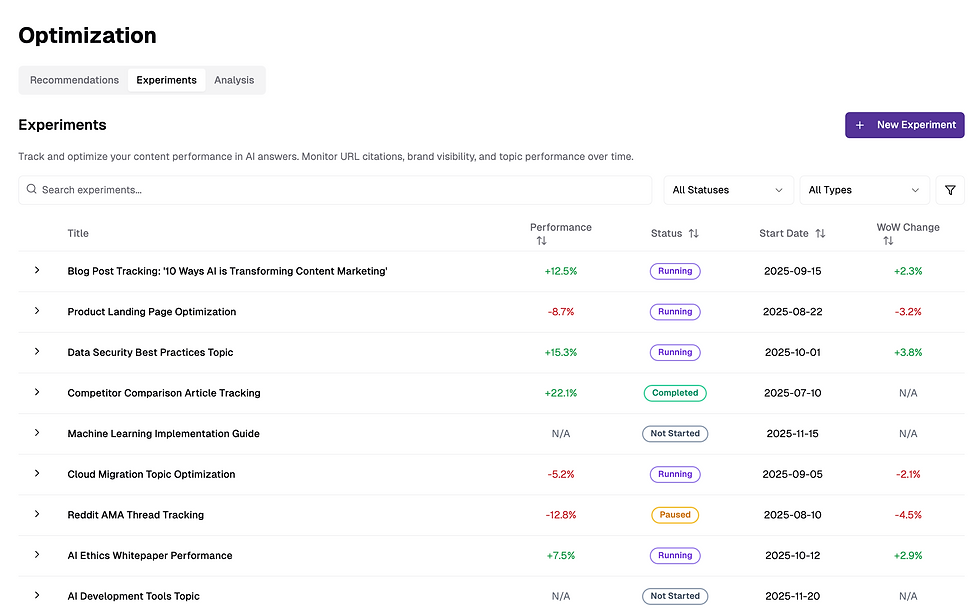- Kiera Carter
- Jul 30, 2025
- 3 min read
Updated: Aug 12, 2025
The question most marketers have around generative engine optimization isn’t “is LLM visibility important for brands?” (Yes.) The question is, “where do I start?”
Beeri Amiel believes he has the answer in his new AI-search platform, XFunnel. XFunnel helps companies navigate the complex world of AI search through experimentation and insights that transform real-time LLM observations into tactics you can track.
Here, as part of our Human in the Loop series, Amiel discusses the past, present, and future of AI search.
How long have you been working with AI?
I’ve been working with AI for five years, as a founder of two AI-related companies. My first company was called ContinueAI, and the goal was to help enterprise teams manage their sustainability programs.
My initial interest in AI stemmed from its potential to enable action, and that’s why I continue to work in AI today. I started XFunnel to help brands make the most of AI search, and it’s really about taking action, not just monitoring your visibility on a dashboard.
Related: Wix Studio's AI tools will transform the way you work
How has your relationship with AI changed over the years (or months)?
The first wave was ChatGPT, which I’ve been using for text-based activities and research since 2022.
The second wave was MCP. All the SaaS hopping I used to do is now done via MCP. I have MCP connect all of my tools—email, Notion, Google Drive, Google Workspace, the internet—so that my work is more efficient. I can quickly create content and studies, automate repeatable data gathering tasks, run analysis on our datasets, create visuals, and do highly targeted business development. This stuff used to take me hours.
What’s your AI-search philosophy right now?
AI search is changing so much, and there’s so much that we don't know. We must experiment to learn.

Can you share a recent success in improving visibility in LLMs?
Brands that work with us improve AI-search visibility by double-digit percentages.
It starts with a product-level analysis, where we track visibility changes in tools like ChatGPT and SearchGPT. Then, we analyze the distribution of a company's content across different levels of buyer intent and compare it to competitors. This analysis often reveals the importance of informational content for AI search visibility.
We see a correlation between brand mentions in top-of-funnel queries (often less competitive) and visibility in middle-of-funnel queries, suggesting a potential strategy to leverage this relationship.
Experimentation is a crucial part of success. Our experimentation process includes identifying key questions and topics, baselining visibility metrics, implementing changes (like adding FAQs), and then monitoring the impact on citation inclusion, brand visibility, rank, and sentiment to close the feedback loop.
What mindset or tactic is most crucial to success in AI search?
Companies that have been most open to experimentation and change have seen the most results. We usually work with teams to develop three core competencies:
A scalable content engine
An offsite arm for third-party blogs and affiliate sites
A UGC engagement team to focus on Reddit and Quora
LLMs want to cite expert (owned) content, but we also see a significant impact of off-site SEO, particularly third-party earned media, affiliate sites, Reddit and Quora, on AI-search engines.

What excites you the most about AI-SEO/GEO right now?
The biggest shift isn't how to optimize for LLMs; it’s a new user behavior. Search is being used to solve new problems, and address new use cases in different ways. To me, this is where true optimization lies: creating value by enabling these new behaviors.
What’s the biggest challenge for marketers diving into AI-SEO today?
AI-SEO is a mindset shift. We're moving from a world of keywords to a world of conversations, and marketers aren’t sure what their north star is for AI search.
For AI search, the whole internet is a database. Offsite activities have even more weight than before (95% of citations are off-site on average). Marketing teams need to flex different muscles. They need to know how to balance AI search and traditional SEO. There is no proper attribution, which makes it hard to know how much to invest. But that’s why experimentation is so important.
What advice do you have for those looking to improve their performance in AI search?
Think about the change in user behavior. Users are looking for ways to solve their problems. Engines are now understanding who their users are deeply. Combining these two things within your content strategy will lead to growth. Experiment often and aggressively.



